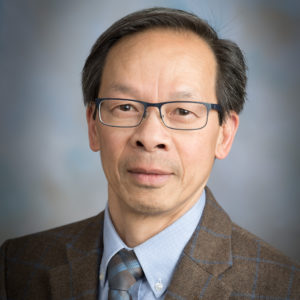 P. Shing Ho, professor in the Department of Biochemistry and Molecular Biology, has received the Colorado State University Scholarship Impact Award. Established by the Office of the Vice President for Research, the award recognizes faculty members whose scholarly work has had a major impact in the world.
P. Shing Ho, professor in the Department of Biochemistry and Molecular Biology, has received the Colorado State University Scholarship Impact Award. Established by the Office of the Vice President for Research, the award recognizes faculty members whose scholarly work has had a major impact in the world.
Ho is an internationally recognized scientist with expertise in DNA structure and function. He is particularly known for his contributions to defining and understanding molecular interactions called halogen bonds. Ho and colleagues have found that different halogen atoms (fluorine, chlorine, bromine and iodine) in organic and biochemical structures can form non-covalent interactions with other atoms that are analogous to hydrogen bonding, but could be much stronger.
His research has demonstrated that a halogen bond can be engineered to direct the conformation of a macromolecule that has a higher stability than a comparable hydrogen bond. Ho’s group has applied this special interaction as a tool to engineer molecular structures, including the design of inhibitors and drugs.
Ho is senior author on the most-cited research article in the field of halogen bonding. Since joining the CSU faculty in 2007, he has authored two of the most highly-cited papers in his field. Over half his publications since 2007 are selected as featured articles in the journals they appear in.
Ho is principal investigator on National Science Foundation grants from both the Biological Science Division and the Chemistry Division – one of few scholars to have obtained research support from two distinct NSF directorates. He has recently been invited to serve as an NSF program director to help determine the overlapping mission of these programs.
At CSU, Ho served as chair of the Department of Biochemistry and Molecular Biology for 10 years, leading the department in the hiring of seven new faculty. He was also awarded the Preston Davis Award for Innovations in Teaching. He is a fellow of the International Union of Pure and Applied Chemistry as well as a Special Member of the Iodine Society (Japan), both in recognition of his halogen bond research.
Ho’s Ph.D. in biochemistry, molecular and cellular biology is from Northwestern University, and he also holds a B.A. in chemistry from Franklin and Marshall College. Before coming to CSU, he was a faculty member and department chair at Oregon State University.